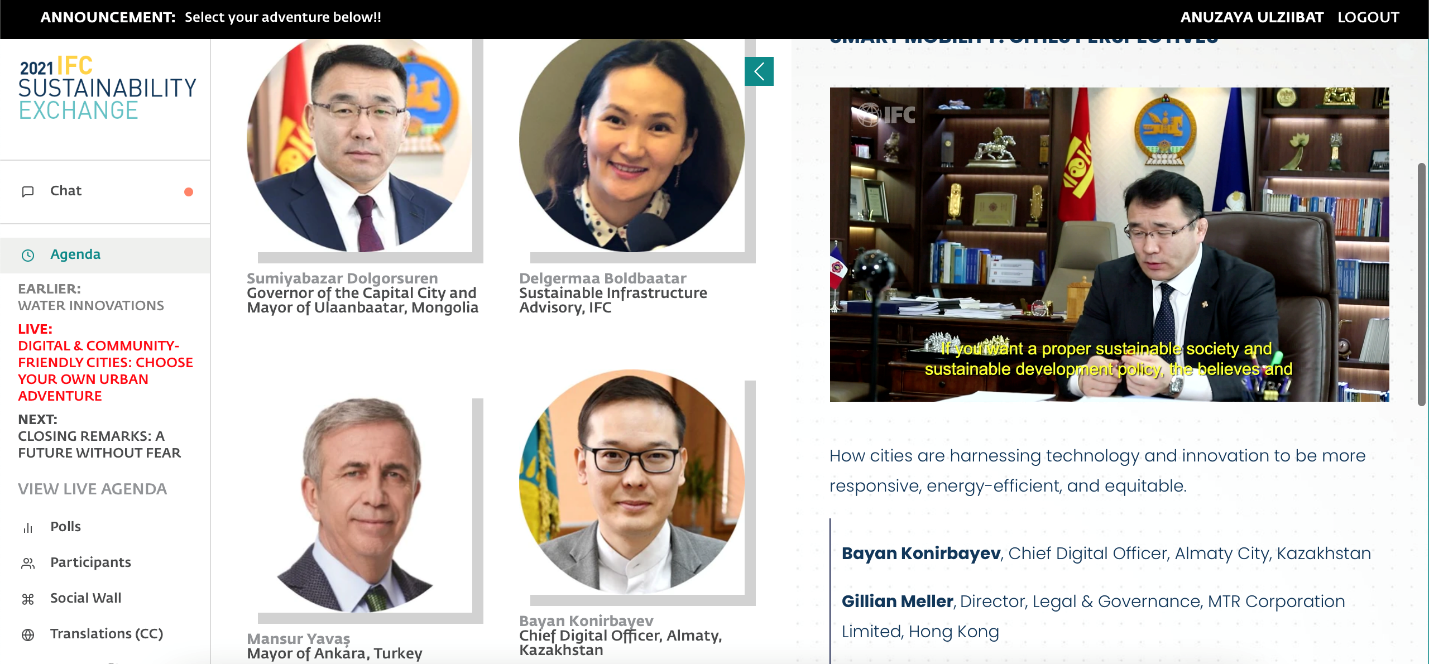Sumiyabazar Dolgorsuren, Governor of the Capital City and Mayor of Ulaanbaatar, spoke about his inspirations and the city’s sustainable development plans during a virtual event — IFC Sustainability Exchange 2021—this month. This year’s theme focused on “Technology, Trust, and Transformation.” The event was attended by representatives from around the globe, including Mary Robinson, former first woman President of Ireland; Don Cheadle, Actor, Director, UN Environment Program Goodwill Ambassador; Mari Pangestu, Managing Director, Development Policy & Partnerships, World Bank Group; Makhtar Diop, Managing Director, IFC; and Rajiv Shah, President, Rockefeller Foundation, who discussed challenges around tech-leadership for inclusive infrastructure development, sustainable financing, digital & community-friendly cities, and e-mobility.
Work hard and keep your promises—that was one of the lessons Sumiyabazar Dolgorsuren learned early in life. While the Mayor of Ulaanbaatar recalls his father’s advice every day, he believes, a strong moral compass, sheer consistency, and defining the right goals are fundamental to the development of a sustainable society.
Sustainable development is central to Mongolia’s national strategy “Vision 2050”. Speaking on smart mobility at an IFC virtual event — Sustainability Exchange 2021 — the Mayor shared his views on how technology can help resolve Ulaanbaatar’s infrastructure and transportation issues along with the importance of supporting young digital entrepreneurs.
Mongolia is about three times as large as France, but a population of just three million makes it the world’s most sparsely populated country. However, almost half the country’s population lives in the capital city Ulaanbaatar, with the number of households in the ger areas increasing rapidly. As a result, the city faces a range of challenges, including air and soil pollution, centralization, and traffic congestion. The number of registered vehicles in the city, for example, has reached 650,000 this year, causing parking issues along with increasing congestion and emissions.

Having witnessed the benefits of smart mobility solutions in the neighboring countries—China and Korea—the Mayor is convinced that technology can offer advanced traffic management systems. “If we can produce enough electricity, we could have an electric bus system. These vehicles, including buses and taxis, can be hybrid—50 percent electricity and 50 percent natural gas—and cause less air pollution,” Sumiyabazar says.
He adds, “IT-based development and concepts are becoming a global trend and Ulaanbaatar’s priority is to be in line with these trends, especially new technologies. We will continue to focus on IT-based projects while pursuing a policy to develop an environmentally friendly, smart, and greener city.”
Going forward, technology solutions can provide the city with an opportunity to build a "smarter" approach to engaging citizens and delivering vital services. But, to implement projects, mobilizing funding and developing private-public partnerships (PPPs) would be essential. In this context, Sumiyabazar believes IFC’s global expertise and extensive experience with municipal governments will be vital for Ulaanbaatar, which is why the Mayor expressed the city’s willingness to cooperate with IFC for technical advice and to create bankable PPPs.
Effective leadership is critical for Ulaanbaatar’s transition to a green and smart city—one that meets international standards. The first step, Sumiyabazar underlines, is to set a goal. Drawing from his life lessons, he further adds that communication among people is essential. That leads to understanding and trust, both of which are essential to defining long-term sustainable growth for Ulaanbaatar.
